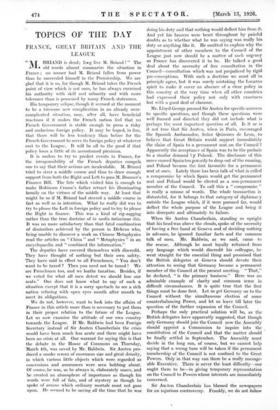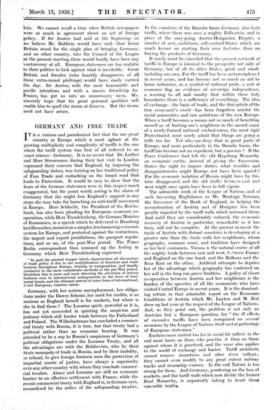TOPICS OF THE DAY FRANCE, GREAT BRITAIN AND THE LE
AGUE " Air BRIAND is dead ; long live M. Briand ! " The -0-1- • old words almost summarize the situation in France.; no sooner had M. Briand fallen from power than he succeeded himself in the Premiership. We are glad that, it is so, for though M. Briand takes the French ,point of view which is not ours, he has always exercised his authority with skill and urbanity and with more tolerance than is possessed by many French statesmen.
His temporary eclipse, though it seemed at the moment to be a tiresome new complication in an already over- eomplicated . situation,. may, after all, have beneficial reactions if . it makes the French nation feel that no French Government is stable enough to press a risky and audacious foreign policy. , It may be hoped, in fine, that there will - be less tendency than before for the French Government to serve its foreign policy at whatever cost to the League. - It will be all to the good if that policy loses a. little of its accustomed precision.
. It is useless to try to predict events in France, for the irresponsibility of the French deputies compels one to say that their actions are incalculable. M. Briand tried. to steer a middle course and thus to draw enough 'support from both the Right and Left to pass M. Doumer's Finance Bill. The -fate which visited him is enough to make Robinson Crusoe's father retract his illuminating homily . on the virtues of the middle way. At least that might be so if M. Briand had steered a middle course in fact as well as in intention. What 'he really did. was to ,try to please. the Left in foreign policy and to try to please the Right in finance. This was a kind of zig-zagging 'rather than the true doctrine of in medio intissimus ibis.
It was no more satisfactory than that fatal combination of dissimilars achieved by the person in Dickens who, being unable to discover a work on Chinese Metaphysics read the articles on " China " and " Metaphysics " in an encyclopaedia and " combined the information."
The deputies have covered themselves with discredit. They have thought of nothing but their own safety.
They have said in effect to all Frenchmen, " You don't want to be taxed ? Then you need not be taxed ! We are Frenchmen too, and we loathe taxation. Besides, if we voted for what all men detest we should lose our seats." One does not know what to say of such a situation except that it is a sorry spectacle to see a rich nation refusing with open eyes month after month to 'meet its obligations.
• We do not, however, want to look into the affairs of France in this article more than is necessary to put them in their proper relation to the future of the League.
"Let us now examine the attitude of our own country towards the League. If Mr. Baldwin had been Foreign Secretary ' instead of Sir Austen Chamberlain the crisis would have been much less acute and' there might have been no crisis at all. Our warrant for saying this is that the debate in the House of Commons on Thursday, 'Mara 4th,-was saved by Mr. Baldwin. Sir Austen pro: dneed a smoke screen of enormous size and great density, in which various little objects which were regarded Tas concessions and assurances were seen bobbing about; Of course, he was, as he always is, elaborately suave, and he created an atmoSphere of importance as though his words were full of 'fate, and of Mystery as' though he spoke of arcana which ordinary mortals must not gaze upon. He seemed to be saying all the time that lie was doing his duty and that nothing would deflect him from it. And yet his hearers were beset throughout by painful -doubts as to whether what he was saying was really his -duty or anything like it. He omitted to explain why the appointment of other members to the Council of the 'League just now should be a matter of such urgency as France has discovered it to be. He talked a good 'deal about the necessity of free consultation in •the `Council—consultation which was not prejudiced by rigid pre-conceptions. With such- a doctrine we must' all -in principle agree, but it was surely mistaking the Locarno spirit to make it cover an absence of a clear policy in this country at the very time when all other countries had expressed their policy not only with exactness but with a good deal of clamour.
Mr. Lloyd George pressed Sir Austen for specific answers . . to specific questions, and though "these questions were well framed and directed they did not include what is perhaps the most important .question of all. Is it or is it not true that Sir Ansten, when in Paris, encouraged the Spanish Ambassador, .Sehor Quinones de Leon, to believe that Great Britain. would, support immediately the claim of Spain to a permanent seat ion- the Council ? Apparently. the acceptance of Spain was to be the prelude to a sinailar..demand Ly Poland: The disclosure of. this move:caused Spain ternporarily. to dropout of the running, and Poland became . the. first favourite fora a permanent seat at once: - Lately there has been talk-of whatis called a compromise by which _Spain would .get the .permanent seat and Poland would be elected as a non-permanent member, of the Council. To call. this a " compromise," is really .a misuse. of words. The whole transaction. is distasteful, for it belongs .to that .category. of diplomac y outside the League which, if it. were .pursued far, would deflect the whole purpose of the League and. bring it into disrepute and • ultimately. to failure. _ When Sir Austen Chamberlain, standing so upright that his head was above the clouds, spoke of the necessity of having a free hand at Geneva and of deciding-nothing in advance, he ignored familiar . facts and the common talk of mend Mr. Baldwin,- as we said, came, to the rescue. Although he -most loyally refrained frOni any language which would- discredit' his -colleague, he went straight for the essential thing and promised that the British delegates at Geneva should devote their attention to seeing that Germany became a -perinanent member of the Council at the preSent meeting; • " That," he declared, " is the primary business."• Here was 'an admirable example Of claritY and • 'common sense in difficult circumstances. It is quite true that the first things must be done first. Let us get Germany on to the Council without the simultaneous election of some counterbalancing Power, and let us leave till later the question of the further expansion of the Council..
Perhaps the only practical solution will be, as the British delegates have apparently suggested, that though only Germany should join the Council now the Assembly should- appoint a Commission to inquire into the constitution of the Council and that the matter should be finally settled in September. The Assembly must decide in the long run, of course; but we cannot help saying that a Wrong turn will be taken if the .permanent membership- of the Council is not confined. to the Great Powers. Only' in that way can there be a 'really_ manage= able Executive. There is never the least diffieulty-L--rior ought there' to be—in 4iYing temporary representation on the Council to Powers whose interests are immediately Concerned.
• Sir Au;ten Chamberlain has blamed the newspapers fiir an controversy. Frankly, we dO not follow him. We cannot recall a time when British newspapers were so much in agreement about an act of foreign policy. If Sir Austen had said at the beginning—as we believe Mr. Baldwin would have said—that Great Britain stood for the single plan of bringing Germany, and no other country, into the Council of the League ;at the present meeting, there would hardly have been any controversy at all. European statesmen are too realistic in their politics to kick against what is inevitable. Great Britain and Sweden (who heartily disapproves of all these extra-mural plottings) would have easily carried the day. Sir Austen, with the most honourable and pacific intentions and with a sincere friendship for Wrance, has got us into an unnecessary mess. We `sincerely hope that his great personal qualities will enable him to quell the storm at Geneva. But the storm need not have arisen.































































 Previous page
Previous page